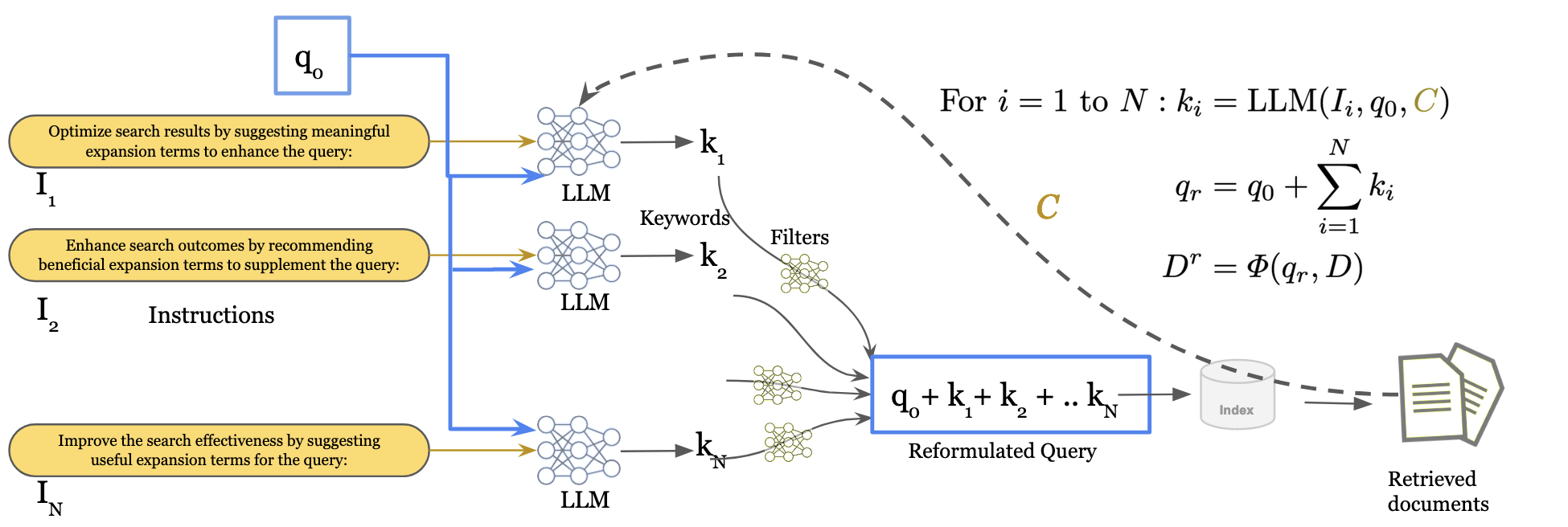Generative Query Reformulation Using Ensemble Prompting, Document Fusion, and Relevance Feedback

0

Sign in to get full access
Overview
- This paper presents a novel approach for generative query reformulation using ensemble prompting, document fusion, and relevance feedback.
- The proposed method aims to improve search engine performance by automatically refining user queries based on retrieved documents and user feedback.
- The key ideas include using an ensemble of language models, fusing relevant document content, and incorporating user relevance judgments.
Plain English Explanation
The paper introduces a technique to help search engines better understand what users are looking for and provide more relevant results. The main idea is to take the original query the user typed, analyze the documents that the search engine found, and then automatically generate a new, improved query that better captures the user's intent.
To do this, the researchers use a technique called ensemble prompting - they combine the outputs of multiple language models to generate a new query. They also fuse together the relevant content from the retrieved documents to get a more comprehensive understanding of the topic. And finally, they incorporate feedback from the user on which results were most relevant to further refine the query.
The key innovation is bringing together these different techniques - ensemble prompting, document fusion, and relevance feedback - to iteratively improve the search query and get better results for the user. This could be particularly helpful for complex information needs that are difficult to capture in a single query.
Technical Explanation
The paper proposes a generative query reformulation framework that combines several key components:
-
Ensemble Prompting: The system uses an ensemble of language models, each with different capabilities, to generate candidate query reformulations. By aggregating the outputs, the ensemble approach can produce more robust and diverse reformulations.
-
Document Fusion: Relevant documents retrieved for the original query are analyzed and fused together to create a unified summary of the topic. This helps the system better understand the context and information needs behind the query.
-
Relevance Feedback: Users provide feedback on the relevance of retrieved documents. This signal is used to fine-tune the language model ensemble and generate reformulations that better match the user's preferences.
The researchers evaluate their approach on several standard information retrieval benchmarks. They find that the combination of ensemble prompting, document fusion, and relevance feedback leads to significant improvements in search quality compared to various baselines. The method is particularly effective for complex, ambiguous queries where a single reformulation may not be sufficient.
Critical Analysis
The paper presents a compelling approach to the important problem of generative query reformulation. The key strengths are the integration of multiple complementary techniques and the strong empirical results demonstrating the method's effectiveness.
However, the paper also acknowledges several limitations and avenues for future work:
- The performance of the system is still dependent on the quality of the underlying language models. Improving these models, especially for domain-specific knowledge, could further boost the reformulation quality.
- The reliance on user feedback may limit the scalability of the approach, as it requires explicit input from searchers. Developing more automated techniques for inferring relevance signals could help address this.
- The paper focuses on improving search quality for individual queries. Exploring how the reformulation system could be leveraged to enhance the overall search experience and knowledge discovery process is an interesting direction for future research.
Overall, the paper makes a valuable contribution to the field of information retrieval and demonstrates the potential of combining generative language models, document understanding, and user interaction for enhancing search capabilities.
Conclusion
This paper presents a novel approach for generative query reformulation that integrates ensemble prompting, document fusion, and relevance feedback. The key innovation is the synergistic combination of these techniques to iteratively refine search queries and provide users with more relevant and comprehensive information.
The empirical results show significant improvements in search quality, particularly for complex queries where a single reformulation may not be sufficient. While the approach has some limitations, it represents an important step forward in enhancing the search experience and helping users find the information they need more effectively.
The ideas and methods introduced in this paper could have broad implications for the field of information retrieval, as well as applications in areas like conversational AI and knowledge discovery. As language models and other AI technologies continue to advance, we can expect to see more sophisticated approaches to query reformulation and search optimization emerge in the coming years.
This summary was produced with help from an AI and may contain inaccuracies - check out the links to read the original source documents!